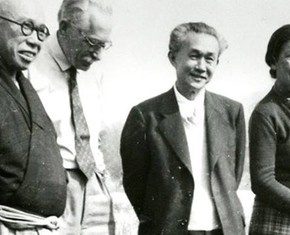The views expressed in our content reflect individual perspectives and do not represent the authoritative views of the Baha'i Faith.
Consultation—the communications tool the Baha’i teachings recommend for all groups seeking unity—has a powerful role to play in our civilization.
What is Baha’i consultation? Abdu’l-Baha, in a talk he gave in Chicago in 1912, defined not only what consultation is, but what it isn’t:
In this Cause consultation is of vital importance, but spiritual conference and not the mere voicing of personal views is intended. In France I was present at a session of the senate, but the experience was not impressive. Parliamentary procedure should have for its object the attainment of the light of truth upon questions presented and not furnish a battleground for opposition and self-opinion. Antagonism and contradiction are unfortunate and always destructive to truth. In the parliamentary meeting mentioned, altercation and useless quibbling were frequent; the result, mostly confusion and turmoil; even in one instance a physical encounter took place between two members. It was not consultation but comedy.
The purpose is to emphasize the statement that consultation must have for its object the investigation of truth. He who expresses an opinion should not voice it as correct and right but set it forth as a contribution to the consensus of opinion, for the light of reality becomes apparent when two opinions coincide. A spark is produced when flint and steel come together. Man should weigh his opinions with the utmost serenity, calmness and composure. Before expressing his own views he should carefully consider the views already advanced by others. If he finds that a previously expressed opinion is more true and worthy, he should accept it immediately and not willfully hold to an opinion of his own. By this excellent method he endeavors to arrive at unity and truth. – Abdu’l-Baha, The Promulgation of Universal Peace, p. 72.
So what did the Universal House of Justice mean when it said, “the code of conduct of the press must embrace the principles and objectives of consultation as revealed by Baha’u’llah?”
First, I am reminded of Jim Lehrer’s “Code of Conduct” described in Part One of this series. Second, in many aspects that journalistic code of fairness and equity mirrors the major principles and objectives of Baha’i consultation:
- Every person has a right to speak, and to be listened to
- When speaking, we speak with a pure motive—to convey the truth
- When listening we clear our minds of preconceptions, stereotypes and judgments
- After everyone has spoken, we share our thoughts, feelings and opinions honestly, openly and kindly, striving for consensus
- Our ideas become the property of the group—not of the individuals who expressed them
- When we agree to act, all unanimously uphold the action as if it were their own
This consultative change in attitude allows everyone to have a voice and be heard. It grants an equal voice to all, privileging no one. It seeks the truth in every matter, whatever that truth may be. It works toward consensus, building unity rather than dissension and distrust.
This consultative method works for advocacy groups and those who oppose them, encouraging a literal debate on the merits of any issue, in full public view, with fair, impartial moderators. How much better to be debating the issues rationally than fighting in the streets with rocks and sticks, or even guns? The forefathers of every democratic country venerated civilized and objective debate, which is why they created citizen-driven institutions, modeled on the ancient public Forum in Greece and Rome where each citizen had a right to speak.
This level of news media consultation with the public may mean, in some places, that we utilize taxpayer funds to support public debate and the sharing of public issues—much more so than is done now. This kind of citizen-driven interaction could counter special interest groups with wads of money airing lopsided views of the issues or personal attacks.
In other words, our cultures require moderation for a free press and free speech. We have laws on the books now against hate speech and threats; but we need a better filter to guarantee the respect of all parties in any adversarial position. If we studied the Baha’i principles of consultation, and adopted them as guidelines for our news media, we could begin building that respect, and the fairness and equity necessary to sustain it.
You May Also Like
Comments

















If useful in this podcast more ideas and personal experiences of the application of consultation:
https://soundcloud.com/discoveringhow-ebbf-podcast/episode-6-consultation-evolve-decision-making-and-other-organizational-processes